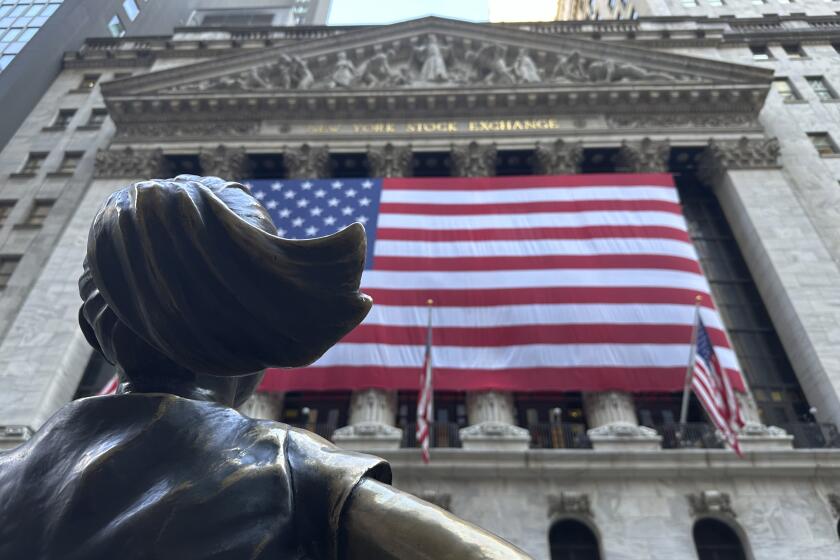Tujunga Golf Project Finds Tycoon Deep in the Rough : Business: Japanese entrepreneur lost $340 million in Pebble Beach deal. He faces FBI money-laundering probe.
Japanese golf tycoon Minoru Isutani may have been vanquished at Pebble Beach, but now he’s back.
Contrary to rumors of his financial demise, Isutani’s corporate entity, Cosmo World, is still twitching in Los Angeles, where the controversial developer is forging ahead with plans to carve a championship golf course out of an ecologically sensitive wetlands tract.
For the record:
12:00 a.m. July 8, 1993 For the Record
Los Angeles Times Thursday July 8, 1993 Home Edition Part A Page 3 Column 5 Metro Desk 2 inches; 58 words Type of Material: Correction
Japanese investor--Because of an error by the Reuters news service, a photograph of a Sumitomo Bank official was mislabeled in Monday’s editions. The photograph was of Daisuke Saji, deputy general manger of Sumitomo Bank Ltd. of Tokyo, who represented an investment group that purchased the Pebble Beach golf complex last year. He mistakenly was identified as Minoru Isutani, the investor who sold the complex.
For the Record
Los Angeles Times Friday July 30, 1993 Home Edition Part A Page 3 Column 1 Metro Desk 4 inches; 132 words Type of Material: Correction
Japanese investor--A story July 5 said that a Beverly Hills restaurant owned by Minoru Isutani and his Los Angeles-based Cosmo World Corp. “failed.” Under Cosmo World ownership, the Robata Restaurant operated at a loss. It subsequently was sold, and remains open under new management, with no ties to Isutani or Cosmo World. The story also characterized Isutani--currently under investigation by the FBI on suspicion of money laundering in connection with his purchase of the Pebble Beach golf resort--as “broke.” The term referred to the $341-million loss taken on the sale of Pebble Beach as well as to the firm’s cash flow problems. It was not intended to reflect on Isutani’s personal wealth. Construction on Cosmo World’s $200-million Four Seasons Kaupulehu golf resort in Hawaii ground to a halt in 1991, but resumed after Kajima Corp., the general contractor, took over financing of the project in a 50% partnership with Isutani’s firm.
He is also fresh in the mind of the FBI, which is investigating Isutani for money laundering.
Isutani is the reclusive entrepreneur who lost a staggering $340 million when he bailed out of his investment in Pebble Beach golf courses early last year. Humiliated, broke and hounded by persistent allegations of a shady background and questionable business practices in Japan, he appeared to have closed shop in America and gone home for good.
But later this month, Isutani faces a critical hurdle in his efforts to obtain a federal environmental permit for the $50-million golf course he wants to build on an expanse of rocks and scrub at the mouth of Big Tujunga Canyon.
The Army Corps of Engineers is expected to rule soon whether the project along the crumbly, mud-sliding south face of the San Gabriel Mountains meets environmental standards and serves the public interest. Opponents of the development are hopeful that regulators will take into account questions about Isutani’s financial solvency, as well as his bruised reputation.
Isutani’s defenders claim that he has been the victim of unwarranted character assassination, which has helped keep the Big Tujunga project in a regulatory sand trap for six years.
Still, some of the more sensitive questions about Isutani’s past remain unresolved, and a stigma of mistrust haunts the developer.
The FBI has confirmed that it is probing allegations that tainted funds may have been involved in the $841-million Pebble Beach purchase in 1990.
Rick Smith, a special agent for the FBI in San Francisco, said the bureau is “conducting an inquiry into allegations of federal criminal violations” in the deal, “one of which is money laundering.”
In a report issued in December by a U.S. Senate subcommittee, Isutani’s Pebble Beach deal was cited as an example of money laundering that investigators suspected had been hidden behind the wave of legitimate investment from Japan in the 1980s.
The Senate panel, which was probing Asian organized crime activities in this country, heard testimony from a confidential informant who said that one of Isutani’s key financial backers in the Pebble Beach deal, Itoman Corp., had ties to the Japanese mob.
Contacted through his lawyer in New York, Isutani declined to be interviewed for this article. But he and his representatives in the past have emphatically denied any criminal associations.
“We’re good at losing money, and we’ve made some bad business decisions over the years. But there’s no evidence that Mr. Isutani has been involved in any money laundering scheme in any of his projects,” protested Steve Timm, vice president of L.A. International Golf Club, the Cosmo World subsidiary that plans to build the golf course in Big Tujunga. “This is yet another character assassination.”
Col. Robert Van Antwerp, district engineer for the Army Corps of Engineers, said Isutani’s apparent financial distress and the allegations of money laundering will be taken into account when the decision is made on a federal permit for the Big Tujunga project.
Performance bonds can be required, he said, to guarantee the completion of the environmental mitigation and flood-control phases of the project, although not the clubhouse or golf course.
Suspected money laundering is a more difficult problem.
“We’ve been presented with the allegations, and I know he’s under investigation,” Van Antwerp said. “But we haven’t consulted with the FBI at this point, and I don’t know what they’d tell us.”
Timm said he is hounded by questions about Isutani’s reputation.
“It’s making my job much more difficult,” he said. “I have to answer these questions every week. I vehemently oppose (the allegations) and I let people know that unless anybody has evidence, we should be considered innocent. If we were an American company, this golf course would have been built by now.”
Isutani, a former Osaka encyclopedia salesman who became a self-made millionaire, offers perhaps a typical profile of the contemporary Japanese entrepreneur.
He beat the system, which favors graduates of elite universities who join major corporations as team players. Individualists and outsiders, entrepreneurs like Isutani often emerge from the demimonde of Japan’s shady real estate industry, which is rampant with speculation, fraud and underworld involvement.
And so Isutani, 53, who never went to college and who made his fortune in Japanese golf course development, brought his shadows when he jumped on the speculative bandwagon of U.S. real estate investment in the late 1980s.
The press has been unkind to Isutani--particularly aggressive Japanese magazines, which have published reports linking him to political fund-raising scandals. They have raised allegations that he reaped profits through the selling of excessive memberships at some of the more than one dozen golf clubs he controls in Japan.
Overselling of golf memberships is a common complaint in Japan’s golf industry, and such charges became the basis for a U.S. money laundering case against developer Ken Mizuno. Now on trial for fraud in Tokyo, Mizuno is suspected of using ill-gotten gains from membership sales in Japan to purchase properties in Palm Springs and Nevada. Mizuno’s U.S. assets have been seized by the Treasury Department.
No charges have been brought against Isutani. He got his start in golf course development in 1972, when he founded his flagship company, General Coast Enterprise, in Tokyo. By the time his Cosmo World subsidiary opened a Los Angeles branch in 1985, he had diversified into golf equipment manufacturing and computer software development.
In America, one of his first ventures was selling imported office safes. Isutani spread to golf equipment sales, opened the Robata restaurant in Beverly Hills (which subsequently failed) and bought himself a high-profile brand name by acquiring Ben Hogan Co., a golf equipment maker based in Ft. Worth.
On the property development front, Isutani at first was attracted by the glitter of Las Vegas, where several Japanese entrepreneurs were making precipitous inroads into the casino industry.
He started with a 50% investment in a small casino, the Barcelona Hotel, with the intention of moving on to more ambitious plans once his gaming license was approved.
The goal, former associates say, was a major casino at his $600-million Silver Canyon Resort, a project then under development in suburban Henderson, Nev., featuring 2,500 high-priced homes, two golf courses and a Palm Springs-style resort hotel.
But Isutani’s vision of becoming a player in the gambling industry began turning sour after he applied for a casino license in 1988.
Nevada Gaming Control Board investigators went to Japan and uncovered questions about business conduct in Isutani’s convoluted corporate group. The allegations ranged from insider trading to financial statement manipulation and political payoffs, according to a source close to the investigation.
At the same time, things were getting hot in Pebble Beach.
Isutani had aroused public outrage with plans to sell private memberships to wealthy Japanese for about $740,000 each--a scheme aimed at leveraging his way out of the crushing debt incurred in his purchase of the fabled coastal property.
Isutani declared his intention to withdraw his casino application in 1991, before he was required to testify under oath before the gaming control board--leaving allegations against him unresolved.
“We withdrew because we felt the controversy involved was too significant in light of what was going on in California,” said Robert Toan of Baker & McKenzie in New York, one of Isutani’s lawyers.
The furor in Pebble Beach ultimately was put to rest when the California Coastal Commission forbid Isutani to sell private memberships.
But that denied Isutani the money he needed to start making loan payments to his Pebble Beach creditors.
By the end of 1991, the Cosmo World subsidiary that was developing the Nevada resort project filed for bankruptcy. Construction ground to a halt at Isutani’s $200-million Four Seasons Kaupulehu golf resort on the north Kona coast of the island of Hawaii. Half a dozen other Cosmo World subsidiaries and affiliates in the United State were sold, dissolved or left insolvent.
In Los Angeles, Cosmo World retrenched, moving out of its posh headquarters in Century City to a three-person office in a suburban mini-mall near the Big Tujunga site. Isutani reportedly has fared no better in Japan, where the financial crash of 1990-91 devastated real estate speculators and golf course developers alike.
“I hope he’s salted away a little money for himself somewhere, because he was really a very nice man” said James D. Bowyer, a Los Angeles investment banker involved in the Pebble Beach deal who had to sue Isutani to collect a multimillion-dollar consulting fee. “But I hear he’s flat broke.”
Isutani’s cash flow problems have not escaped the notice of neighbors opposing his golf course development at Big Tujunga Wash.
“It is not in the public interest or welfare to allow a company with questionable financial stability to build the project,” the Shadow Hills Property Owners Assn. wrote in a letter to the city planning department, which would be the next regulatory hurdle if the federal permit is granted. “A half-finished project will be a disaster.”
Public records show that more than $20 million in liens have been placed on Cosmo World’s 355 acres in Big Tujunga--property that project manager Timm says is worth less than $3 million. Most of the debt is owed to the project’s general contractor, Kajima Engineering and Construction of Pasadena, which was the major creditor in the Nevada subsidiary’s bankruptcy proceedings.
Although Kajima’s Tokyo parent has taken over the financing of Isutani’s Hawaii project in a 50% partnership with Cosmo World, both sides said no such arrangements are being contemplated in Los Angeles.
It is anybody’s guess what Isutani’s fortunes will prove to be with the last American project under his control. Timm concedes that Isutani’s loss at Pebble Beach was devastating. But he insists that it was not a mortal blow.
“Do we fold up, or do we fight back?” he asked. “Mr. Isutani is the golf king of Japan, and when he makes a commitment, he plans to follow it through.
“He’s always seen the L.A. course as the key ingredient of his overall plan for a global network of tournament golf courses,” said Timm, forsaking the broken dream of Pebble Beach. “Getting this project going will be what rekindles Cosmo World in the world of international golf club development.”
Sand Trap in the San Gabriels
Japanese developer Minoru Isutani’s efforts to build a golf course in Big Tujunga Wash have been caught up in controversy for six years. Site of the proposed club is an ecologically sensitive wetland on the south face of the San Gabriel Mountains.
More to Read
Inside the business of entertainment
The Wide Shot brings you news, analysis and insights on everything from streaming wars to production — and what it all means for the future.
You may occasionally receive promotional content from the Los Angeles Times.






